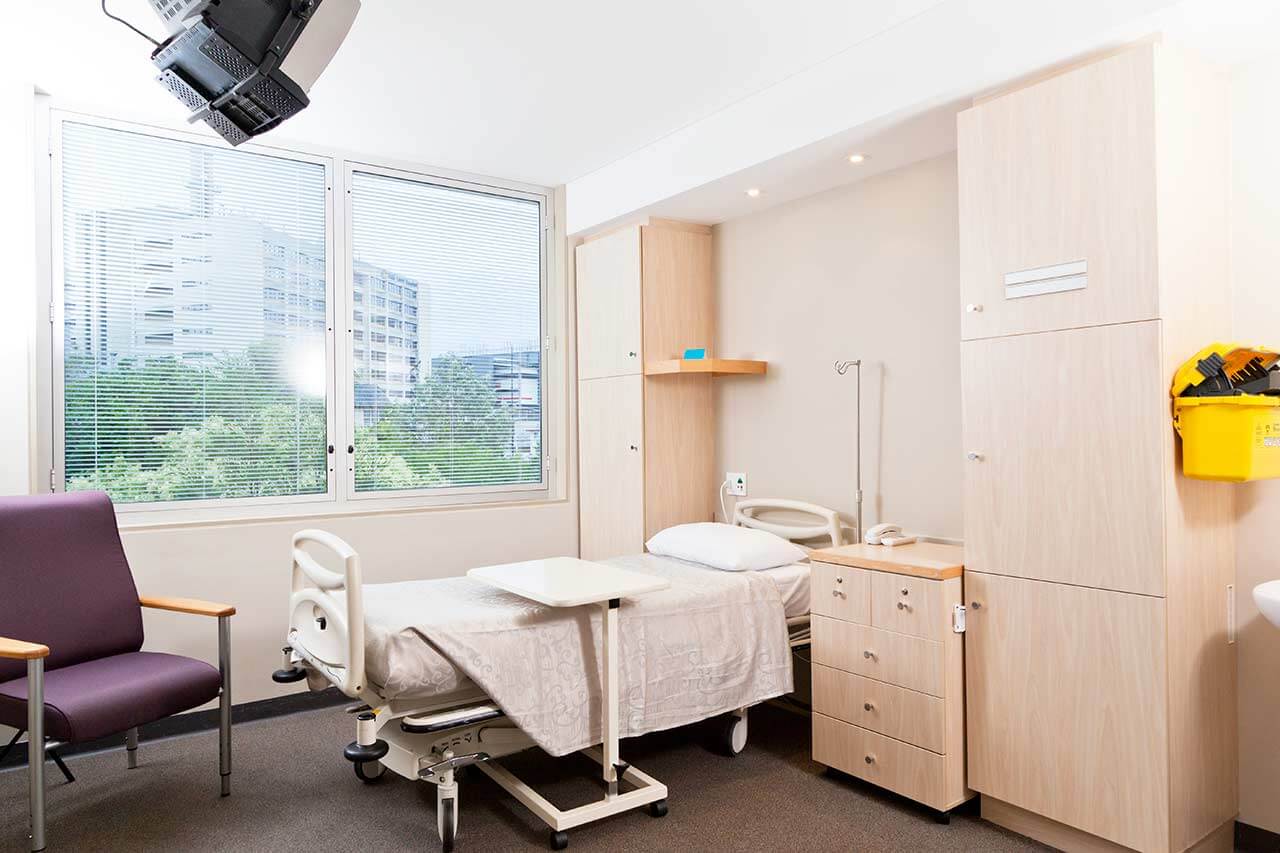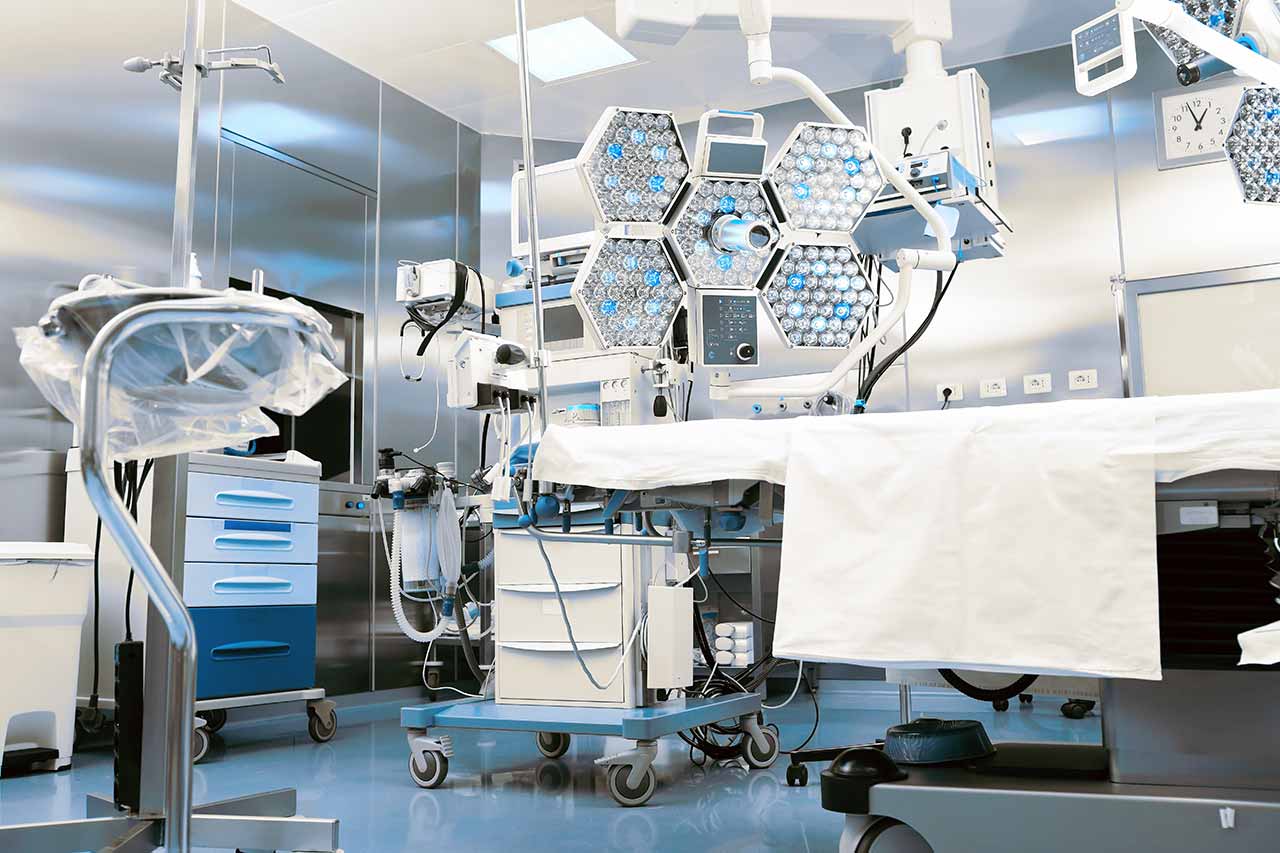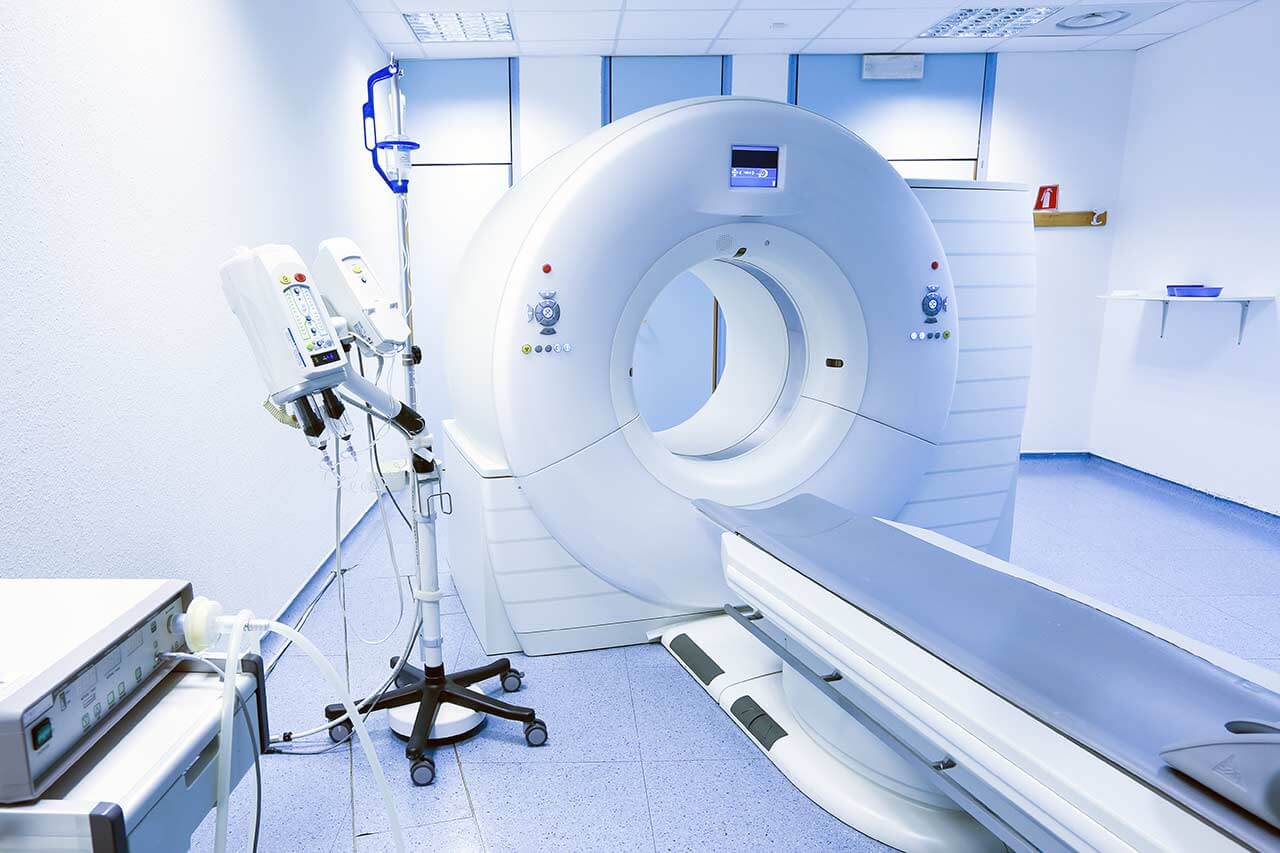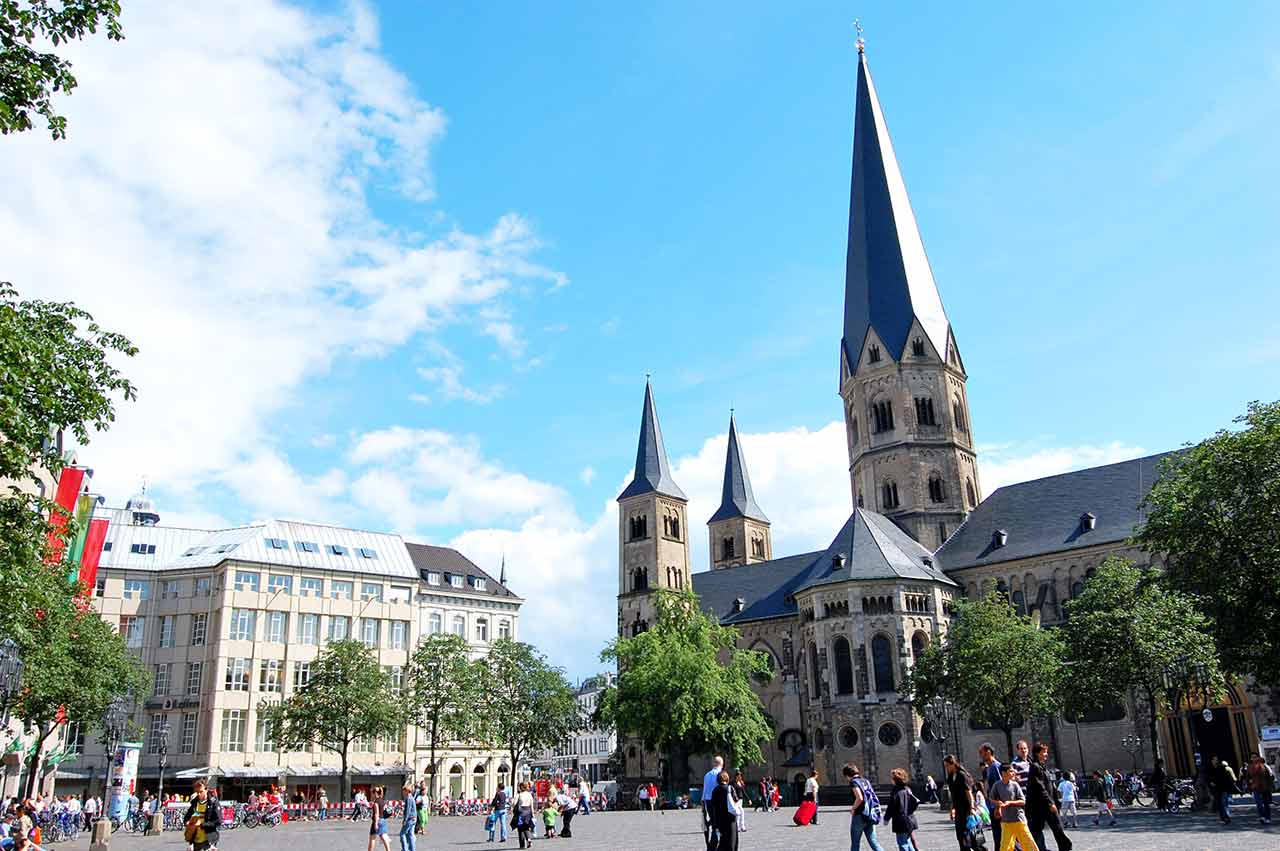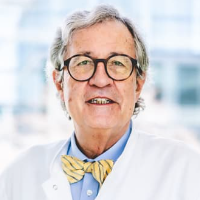
The program includes:
- Initial presentation in the clinic
- case history collection
- general clinical examination
- laboratory tests:
- complete blood count
- general urine analysis
- biochemical analysis of blood
- TSH-basal, fT3, fT4
- tumor markers (thyroglobulin (TG),
TG antibodies (TgAb)) - indicators of inflammation
- indicators of blood coagulation
- ultrasound scan of the thyroid gland
- thyroid scintigraphy
- radioiodine therapy
- symptomatic treatment
- cost of essential medicines
- nursing services
- stay in the hospital with full board in 2-bed room
- elaboration of further recommendations
How program is carried out
During the first visit, the doctor will conduct a clinical examination and go through the results of the available diagnostic tests. After that, you will undergo the necessary additional examination, such as the assessment of liver and kidney function, ultrasound scan of the thyroid gland and lymph nodes of the neck, thyroid scintigraphy. This will allow your doctor to assess how effective radioiodine therapy will be and how well you will tolerate it. In addition, the doctor will calculate the dosage of the drug you need.
Radioiodine therapy with I-131 includes oral administration of the drug. You will take 1 to 4 radioactive iodine capsules or drink about a teaspoon of liquid with radioactive iodine. You will take the drug in your ward, without visiting the manipulation room or operating room.
After taking radioactive iodine, you will stay in your ward for 24 to 48 hours. The next morning after the procedure, the dosimetrist will determine the amount of radiation in your body. If the amount is low, you will be allowed to leave your ward and will be discharged from the hospital. If the amount is high, then the dosimetric control will continue for another day, until a low amount of radiation in your body is detected.
The isotope I-131 can accumulate not only in the thyroid gland, but also partially in the salivary glands. This can cause dry mouth. To get rid of this side effect, you will dissolve sour candies, as this stimulates the work of salivary glands.
The drug is quickly excreted by the kidneys, and after 48 hours you will no longer pose a danger to others. After the procedure, you should drink at least 1 glass of water per hour and visit the toilet regularly. This will allow you to quickly remove radioactive iodine from the body. Food can be usual, without excess iodine in the diet.
During these 48 hours, you can read, use a mobile phone, tablet or computer. All these devices will not be a source of radiation in the future.
Control examination includes scintigraphy, which is performed 7-10 days after radioiodine therapy. Based on the results of the examination, the doctor will determine how well the cells of the thyroid gland (or cancer metastases) have accumulated radioactive iodine. In a few weeks after the procedure, you will have a control blood test for thyroid hormones. In the future, you will visit an endocrinologist regularly.
Required documents
- Medical records
- MRI/CT scan (not older than 3 months)
- Biopsy results (if available)
Service
You may also book:
 BookingHealth Price from:
BookingHealth Price from:
About the department
The Department of Nuclear Medicine at the Beta Clinic Bonn offers modern diagnostics and treatment with radioisotopes. During the procedure, a radiopharmaceutical is injected intravenously into the patient, which accumulates in the pathological focus, due to which a doctor can obtain the necessary diagnostic data or achieve the desired therapeutic result. The department's medical team cooperates closely with the specialists from the Department of Nuclear Medicine at the University Hospital Bonn, so patients receive top-class medical care that meets the standards of university medicine. A separate specialization of the department's doctors is radioiodine therapy in patients with benign and malignant thyroid diseases. The scope of services of the medical facility also includes radioisotope treatment for liver tumors, liver metastases, neuroendocrine tumors, and bone metastases. The treatment regimen is developed for each patient on an individual basis, which contributes to the high effectiveness of therapy. The department strictly observes the norms of radiation safety and the requirements of professional societies. The department is headed by Prof. Dr. med. Hans-Jürgen Biersack.
Patients with thyroid diseases are the focus of the department's doctors' attention. The full range of thyroid examinations is carried out here to detect the slightest pathological changes in the organ. The diagnosis begins with a clinical examination of the patient and palpation of the thyroid gland. Hormone testing is then prescribed, including tests for free triiodothyronine (FT3), free thyroxine (FT4), and thyroid stimulating hormone (TSH). The next step includes a classic thyroid ultrasound scan and duplex sonography. With appropriate clinical indications, thyroid scintigraphy may be conducted. This allows doctors to assess the intensity of metabolism, obtain data on the shape and size of the organ, and also determine the function of the thyroid gland (decreased or increased function). With all the diagnostic results available, the attending physician can make an accurate diagnosis and develop an optimal treatment regimen for the patient.
Most often, the department's specialists carry out radioiodine therapy for goiter, hyperthyroidism (overactive thyroid), and thyroid cancer. The therapeutic procedure involves the oral administration of an individually calculated dose of radioactive iodine-131 in the form of capsules or liquid. The dose of the drug depends on the stage of the disease, the weight of the patient, and other factors. The targeted effect of radioactive iodine is ensured by the fact that it is absorbed only by hormonally active cells of the thyroid gland. The department's team of doctors regularly performs radioiodine therapy and has vast experience in this field. The experience of the department's doctors allows them to determine the optimal dosage of the radiopharmaceutical agent for each patient, which plays a decisive role in the treatment's success. Once in the thyroid cells, radioactive iodine emits beta radiation that damages the thyroid cells. Radioiodine therapy is carried out on an inpatient basis. As a rule, the duration of a hospital stay is 2-6 days. The final treatment outcome can be assessed after a few months.
The department also specializes in the radioisotope treatment of neuroendocrine tumors. Such tumors are quite rare, so not all medical facilities have the necessary professional skills and resources to help such patients. Neuroendocrine tumors may develop in various organs, including the lungs, stomach, pancreas, and liver. Despite the fact that neuroendocrine tumors are relatively rare, they are quite dangerous because they do not cause any symptoms for a long time. In most cases, the treatment is based on surgery, but sometimes the localization of the neoplasm does not allow it to be performed. In such cases, the department's specialists offer an effective method of radioisotope treatment for neuroendocrine tumors, namely peptide receptor radionuclide therapy (PRRT). The therapeutic procedure can relieve symptoms, slow down or stop the growth of the neoplasm, and increase the patient's life expectancy. The essence of PRRT is as follows: the analogue of somatostatin is labeled with the radionuclide Lutetium-177. Somatostatin receptors are present on the surface of a neuroendocrine tumor. Therefore, after the administration of a radiopharmaceutical, it independently finds cancer cells and destroys them with Lutetium-177 radiation. Lutetium-177 radiation does not extend far, which makes it possible to exclude damage to healthy adjacent tissues. Peptide receptor radionuclide therapy takes about 15-20 minutes. Before the procedure, the patient is given an injection of an amino acid solution that protects the kidneys from damage. Radiopeptides are also administered intravenously. In addition, to reduce the load on the kidneys, the patient needs to drink plenty of water before and after therapy. The standard course of treatment consists of 4 sessions with an interval of 8 weeks.
The department's therapeutic options include:
- Radioiodine therapy for goiter, hyperthyroidism (overactive thyroid), and thyroid cancer
- Peptide receptor radionuclide therapy (PRRT) for neuroendocrine tumors
- Radioembolization for liver tumors and liver metastases
- Radionuclide treatment for bone metastases
- Other treatment methods
Curriculum vitae
Higher Education and Professional Career
- 1966 - 1972 Medical studies in Bonn.
- 1974 Thesis defense.
- 1974 - 1978 Residency, Department of Nuclear Medicine, University Hospital Bonn.
- 1978 Venia Legendi in Nuclear Medicine, University of Bonn.
- 1978 Deputy Head of the Department of Nuclear Medicine, University Hospital Bonn.
- 1982 Professorship for Nuclear Medicine, University Hospital Bonn.
- 1986 Professor and Head of the Department of Nuclear Medicine, University Hospital Bonn.
- 1988 - 1990 Dean, Faculty of Medicine, University of Bonn.
- 1990 - 1992 Vice Dean, Faculty of Medicine, University of Bonn.
- 1990 - 1992 Senator of the Senate of the University of Bonn.
- 1992 - 1994 President of the German Society of Nuclear Medicine.
- 1994 - 1998 President of the World Federation of Nuclear Medicine and Biology.
- 1997 - 2000 Vice Rector (Research), University of Bonn.
- 2012 Congress President of the German Society of Nuclear Medicine.
Awards and Honors
- 1979 Alfred Gütgemann Award.
- Order of Merit, Federal Republic of Germany.
- Sign of Honor, Red Cross.
- 2000 Werner Heisenberg Medaille.
Publications
- Author of over 600 articles, 400 of which are posted on PubMed®, and author of 650 abstracts, 310 book chapters, and 35 books.
Photo of the doctor: (c) Beta Klinik Service-, Verwaltungs- und Forschungs- GmbH
About hospital
The Beta Clinic Bonn is a modern private healthcare facility with 20 specialized departments. In addition, the clinic cooperates with 30 independent doctors of various specializations, most of whom have their own private practices. The doors of the clinic first opened for patients in 2008. Since that time, the medical facility has expanded significantly and achieved outstanding success. It harmoniously combines state-of-the-art equipment, high levels of competence among doctors, and comfortable infrastructure. All these possibilities make it possible to provide patients with high-quality medical care in accordance with modern European standards. The work of the medical team at the clinic is based on the following principle: "Our task is to take care of the health of patients." The clinic provides comprehensive treatment, taking into account the individual needs and wishes of each patient.
The hospital has an excellent diagnostic base: rooms for instrumental diagnostics, imaging tests, and endoscopic procedures. The medical complex also has in-house laboratories with advanced equipment. The clinic's doctors have the opportunity to perform comprehensive diagnostics in the shortest possible time and detect the slightest pathological changes in the work and structure of the internal organs. When considering the diagnostic results in complex clinical cases, physicians from related specialties are often involved in the process so that all important aspects are taken into account when developing a treatment regimen for a patient.
The therapeutic options at the clinic are quite diverse. At the same time, doctors always strive to keep pace with innovations, carrying out treatment using the most modern and sparing techniques. The operating rooms at the clinic have advanced computer equipment, navigation devices, monitoring systems, surgical microscopes, special tools, and equipment for laparoscopic and endoscopic interventions, as well as laser systems. The clinic also has an in-house Rehabilitation Center, where patients undergo physiotherapy and therapeutic exercises.
The clinic is expanding more and more every year. Innovative developments in diagnostics and treatment are immediately introduced here. It is worth noting that the clinic is a pioneer in Germany in advanced laser treatment for epilepsy. The therapy was implemented into clinical practice in 2019 and has been successfully applied here since then.
Photo: (с) depositphotos
Accommodation in hospital
Patients rooms
The patients of the Beta Clinic Bonn live in comfortable single rooms. Each room has a separate bathroom with a shower and toilet. The rooms have a modern design and meet the standards of a high-class hotel. For the convenience of patients, the rooms are equipped with electrically adjustable beds, air conditioning, satellite and Internet TV, a telephone, and Wi-Fi.
The clinic also offers accommodations in enhanced comfort rooms. Such patient rooms have a more refined design. In addition, they are very spacious. Enhanced comfort rooms have a minibar, daily fresh fruit, and a special dinner menu. Most windows of the clinic's patient rooms offer a beautiful view of the Rhine River and beautiful green landscapes.
Meals and Menus
The patients of the clinic are offered balanced, delicious food: a buffet breakfast, a hearty three-course lunch, and a light dinner. Also, for dinner, one can taste special offers from the chef at the hospital restaurant, which, if desired, can be served to the patient room.
Further details
Standard rooms include:
Accompanying person
Your accompanying person may stay with you in your patient room or at the hotel of your choice during the inpatient program.
Hotel
You may stay at the hotel of your choice during the outpatient program. Our managers will support you for selecting the best option.
In the immediate vicinity of the clinic is the Kameha Grand, a five-star hotel. The exterior and interior of the hotel impress with their beauty. In addition, the hotel is famous for its excellent service. The hotel is located on the banks of the Rhine and offers picturesque views from its windows.
